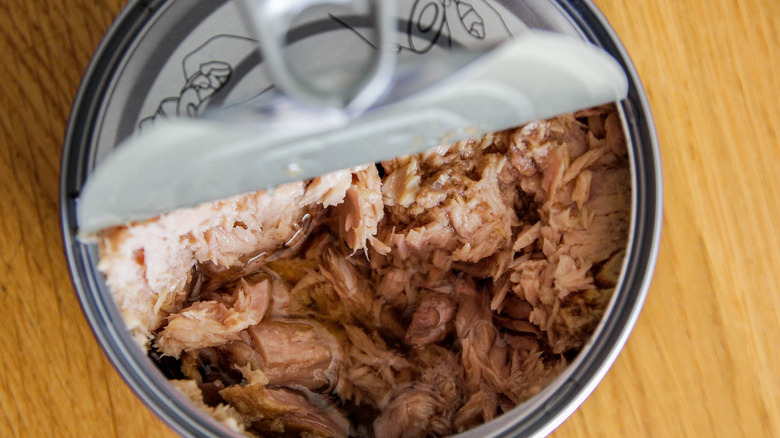Is Canned Tuna Actually Considered Processed Meat?
Canned tuna has widespread popularity as an affordable and tasty ingredient that we incorporate into tuna salad, sandwiches, and pasta salads, to name a few. Like any canned or jarred good, you might assume that this is processed meat. You'd be right! But before you assume the worst, you should know that processed foods encompass numerous categories, and they aren't all bad.
On the most basic level, processing food refers to manipulating or changing a food from its natural state. Global and national health organizations follow a categorical system for processed foods known as NOVA that comprises four categories of processing: minimally processed, processed culinary ingredients, processed foods, and ultra-processed foods. Each category builds upon the one preceding it.
Canned tuna falls under the category of processed foods, which is defined as minimally processed foods manufactured with the help of processed culinary ingredients. Processed foods usually contain only a handful of ingredients like salt, sugar, oil, or vinegar used to preserve canned goods. Canned tuna is cooked whole by baking, then tinned in either water, saltwater brine, or oil. Pre-cooking and preserving tuna are two types of processing that are routinely used and not detrimental to your health.
Canned tuna is a processed food with plenty of health benefits; it's a great source of lean protein and omega-3 fatty acids while still being a low-fat, low-calorie food. If you're trying to stay away from sodium, you can opt for water and oil-packed tuna, instead of brine-packed varieties.
What is ultra-processed meat?
Processing food is such a broad category that includes harmless alterations, as evidenced by canned tuna. However, the stigma of such items as something to avoid comes from the last category, namely ultra-processed foods. Ultra-processed foods use either harmful pre-cooking methods like frying, industrialized processing methods like extrusion or moulding, synthetic or modified culinary ingredients like hydrogenated oils, and chemical preservatives or flavor enhancers. Such techniques and modified ingredients deplete the nutritional content or value of minimally processed foods or present other health problems like obesity, cancer, cardiovascular diseases, and diabetes.
Most ultra-processed foods have a food label with a long list of unrecognizable ingredients or words like "modified," "artificial flavors," and "high-fructose corn syrup," to name a few. The only ultra-processed fish products that fall under this category are fish sticks, TV dinners with pre-cooked or fried fish, or packaged fish burger patties.
That said, you might use ultra-processed foods to make a common canned tuna recipe more elaborate. A classic tuna salad made with store-bought mayonnaise or a tuna salad sandwich on packaged bread will likely contain ultra-processed ingredients. It's easy enough to swap sandwich bread for a loaf prepared at the bakery of your local grocer, or to make your own mayonnaise by simply whisking egg yolks, oil, and lemon juice.

